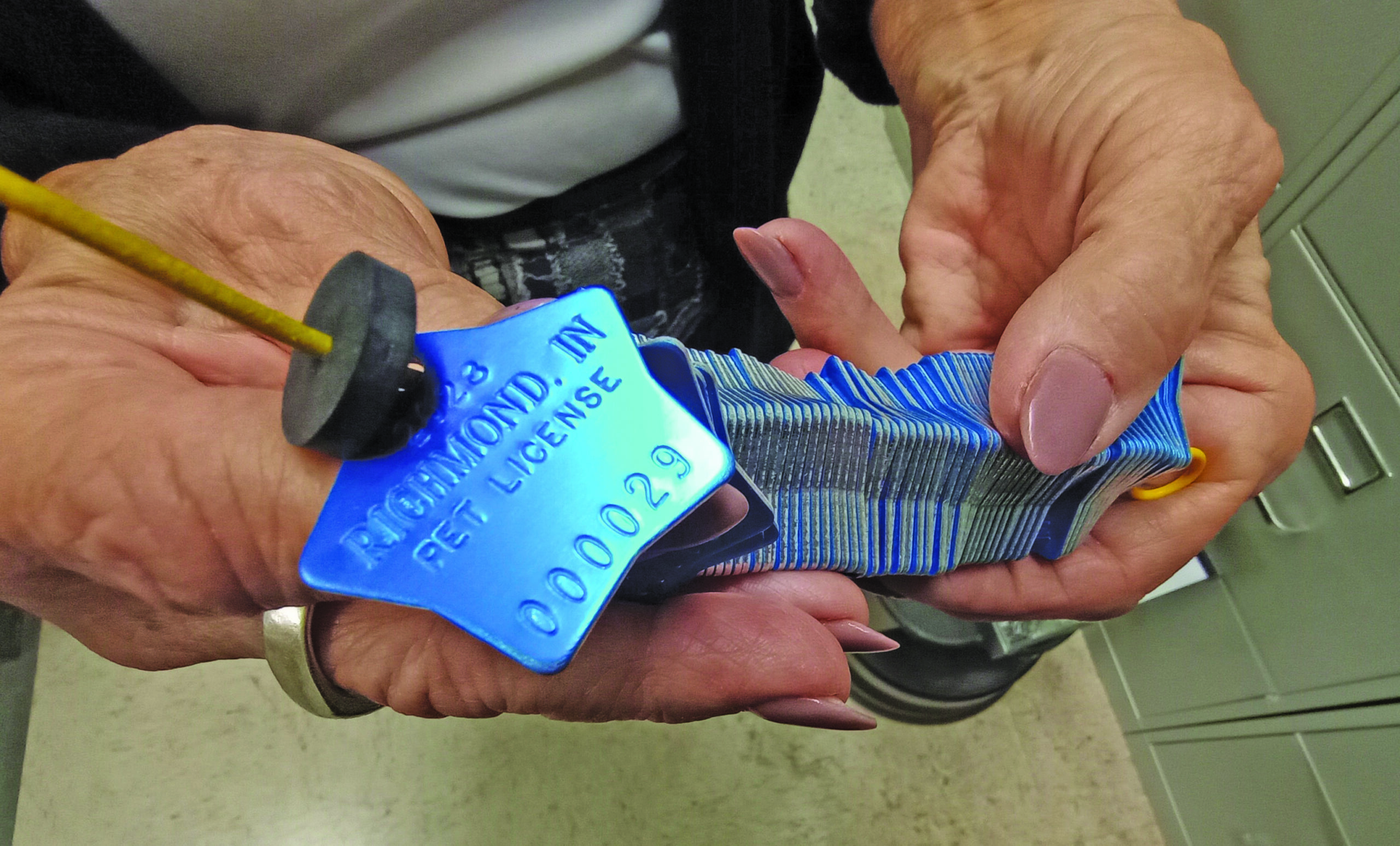City law requires registration, tags for dogs and cats
A blue, star-shaped tag can help return an escaped dog or cat home to its loving family.
It’s the first thing Richmond Police Department Animal Control Officer Desiree Durbin looks for when picking up a runaway pet. The city-issued tags, which are required by ordinance, help her identify where the pet belongs and facilitate a happy reunion.
“My main goal is the safety and security of animals in Richmond, whether that’s they’re in a bad situation, they’ve been hurt or they’re just running loose with the possibility of getting hurt,” Durbin said. “I want to get them help, get them home.”
Finding stray animals — more dogs than cats — is an everyday occurrence. Durbin estimates she returns about 60% of those home, but that means she takes about 40% to the Henry County Humane Society in New Castle, which contracts with Richmond to accept its loose animals.
Durbin, who began as animal control officer during December 2021, will take time to scroll Facebook, animal sites and knock on doors to try and identify where an animal lives before putting it into the shelter.
“I try to use any resource that I have available to me,” she said. “It’s better for the pet. Shelter situations are not the best situations for animals.”
The tags, with up-to-date phone numbers and addresses, assist Durbin with returning pets home, but Clerk Karen Chasteen said only 35 dogs and cats have been registered so far this year. Numbers have dropped through the coronavirus pandemic, Chasteen said, plus some residents might not be aware they need to register a pet or that the registration requirement includes cats, even those that stay indoors.
Annual registrations regularly topped 150, but they dropped to 109 during 2021 and 48 during 2022.
“It’s not a moneymaking thing for the city of Richmond,” Chasteen said. “It’s about public health for rabies. We see the certificate that they’ve had a rabies shot.”
Annual registration costs $15, or $8 with a certificate that proves sterilization. It’s also $8 after July 1. Residents have 30 days to register new pets or to register their pets after relocating to the city. Lost tags may be replaced for $2, and it’s $2 to update information if ownership of a pet changes during the year.
Those wanting a tag must visit the clerk’s office on the second floor of the Richmond Municipal Building, 50 N. Fifth St. during open hours; online registration is not available.
A tag must be displayed on a pet’s collar, and the city ordinance also requires identification information, such as the owner’s name, address and telephone number, also be affixed to the collar.
“That’s a pretty cheap insurance policy that you get your dog back in a quick manner,” said Lt. Donnie Benedict, Durbin’s supervisor, about the city tags.
Durbin, who also uses microchips implanted in pets to find their homes, said more people purchasing city tags will help her do her job better.
“It would be helpful to me for that to happen, but getting people to do it is hard,” she said.
Also by ordinance, any animal older than 6 months must be immunized against rabies. The registration tags, because of the rabies vaccination proof required, are important in case a pet bites a person or another animal, Chasteen said.
Richmond Police Department was dispatched 65 times during 2022 for animal bites, according to Wayne County Emergency Communications Center statistics. Officers were dispatched 1,336 times for animal problems and 91 times for animal neglect.
When Durbin can’t find an animal’s home, she impounds them at the Henry County Humane Society. Richmond has contracted with the Humane Society to house up to 400 city animals this year for $41,200. Any additional animals housed would cost $103 per animal.
Claiming an impounded pet includes paying boarding and administrative fees.
Durbin has discretion about citing pet owners for animals found at large, but said she doesn’t like writing citations. She said her dog’s a runner, so she understands pets can escape.
“I get it. I understand things happen, and I’m not out here punishing people for it,” Durbin said. “I’m just trying to limit the amount of times it happens so it’s safer for their animals.”
A first citation includes a $100 fine, with the fine increasing to $250 for a second citation, $500 and possible impounding for a third and $1,000 and mandatory impounding for each additional citation.
“It’s typically not our protocol to write a ticket if we find a dog running loose in the neighborhood and we happen to find its owner,” Benedict said. “If it’s a continuous problem and the dog’s running loose, that’s when the fines have some teeth.”
A version of this article appeared in the April 5 2023 print edition of the Western Wayne News.

